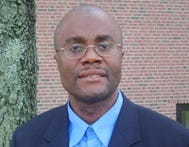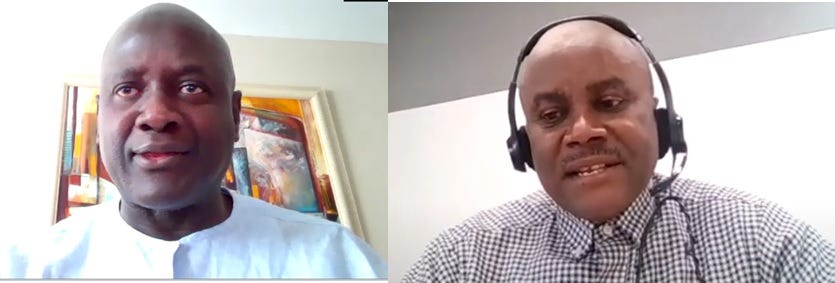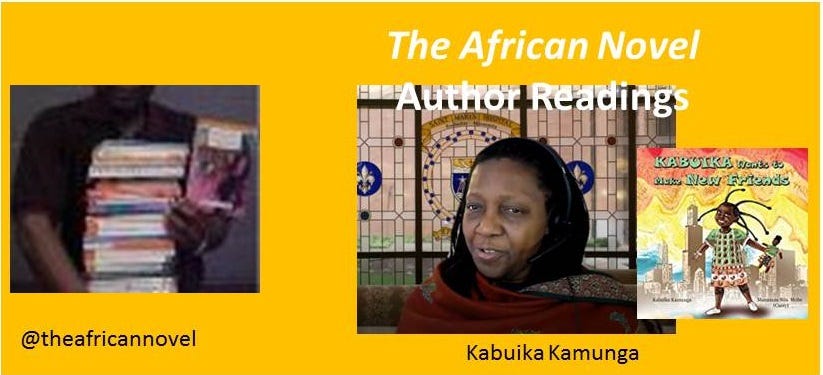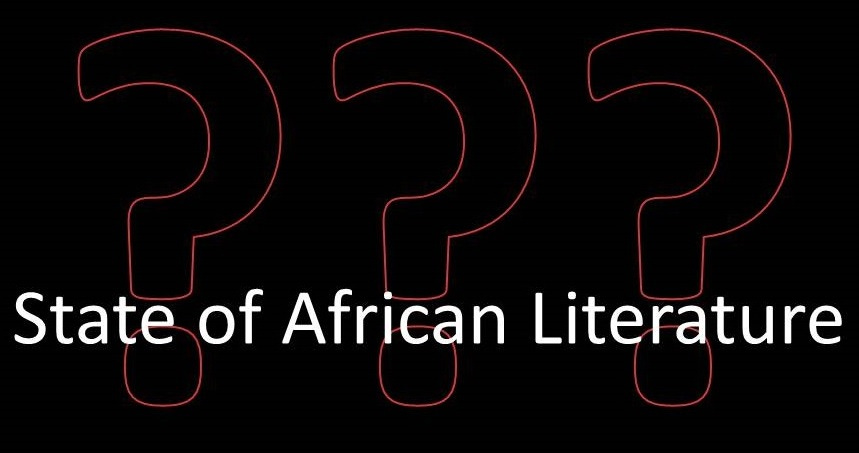Welcome to the latest issue of The African Novel digital newsletter. You have joined an exciting global community of publishers, authors, readers, writers, poets, and performers, as well as academics, missionaries, and even current and former Peace Corps volunteers. We are all connected in our passion for appreciating, celebrating, and sharing African literature and performance in its many forms.
To savor this e-newsletter, we’d highly recommend you patiently read from top to bottom!
Thanks for reading The African Novel! Subscribe for free to receive new posts.
IN THIS ISSUE
Editor-in-Chief's Message
Young Writers Corner: Adaobi Iwuanyanwu*
The African Novel Podcast: Poet Tijan Sallah Part 2
Author Readings: Kabuika Kamunga
State of African Literature
Bookshelf
Book Events & More
Our Radio Archives
African Proverb: Somali
Editor-in-Chief’s Message
Onto 2023 with Much Gratitude to You
We welcome you, our reader, into 2023! We welcome January 2023 as the 10th-month anniversary of this newsletter. With the April issue, we shall be marking our one-year anniversary.
Onto 2023 we march with ebullience. We do so with much gratitude to you — for your support and encouragement. You have demonstrated your unique appreciation of the service we provide here with The African Novel newsletter and its accompanying podcasts.
Our passion meets your remarkable interest in our multimedia content. We trust you will be willing to support us with your paid subscription when we introduce it by March or April.
Meanwhile, as we promised last month, we have in this issue an occasional feature called “Young Writers Corner.” It takes the place of the Book Review/Excerpt. (*Book Excerpt 2: Eyes of the Slain Woman will return in February).
Enjoy!
Cyril Ibe, Ph.D.
P.S. Perhaps a friend forwarded this email to you. Sign up now to receive The African Novel directly in your inbox.
Please share the enjoyment of reading The African Novel digital newsletter with a friend, family member, or colleague.
YOUNG WRITERS CORNER
Q & A With Young Writer Adaobi Iwuanyanwu
This month, we feature an occasional feature titled, “Young Writers Corner.” Taking the spotlight of this corner is Adaobi Iwuanyanwu, a graduating high school senior living in southwest Ohio. Adaobi, born to two Nigerian parents, has been amassing creative writing awards since 5th grade. The African Novel caught up with her for a brief Q & A:
The African Novel (TAN): What was your latest award for writing, and what does this particular prize mean to you?
Adaobi Iwuanyanwu (AI): The latest writing award I received is the “In Her Words Essay” 3rd place prize from the Northern Cincinnati Foundation’s Women Walking West. This award is particularly important to me because it gave me the opportunity to write about how I plan to make the world a more peaceful and prosperous place. In the essay, I talked about the Nigeria SARS (Special Anti-Robbery Squad) police [unit] and how they are a huge ongoing issue in Nigeria and related to the police brutality that goes on in America. I connected these two cases of discrimination to portray how injustice and inequality are problems that occur throughout numerous countries in different ways and explained that the best way to solve (or at least mitigate) these problems is by refusing to remain silent about them.
TAN: What was your first piece of writing that garnered you an award or recognition, and what was it about?
AI: The first recognition I received for my writing was in 5th grade. It was for my D.A.R.E essay for the Drug resistance and prevention program at my elementary school.
“…while writing is my hobby, medicine is my passion. In fact, I plan to use the art of writing and speech as a tool in my future career as a doctor because I believe it will help me to advance the medical industry and the healthcare field. That is the reason why I love writing: it is a constant motivator for change that allows for a diverse range of voices to be heard.”
TAN: Who or what inspired you to become a budding writer?
AI: My father, Professor Obiwu Iwuanyanwu, was the person who inspired me to start writing. However, the older I became, the more things I learned, the more passions I discovered, and theories I questioned. Writing, for me, has always been a way to talk about all those interests and express my thoughts to the fullest.
TAN: How do you start writing a story, and how easily does it flow when you put pen to paper?
AI: It depends on the type of writing. For instance, if it is an informational essay, I actually find those a little easier to write than a fictional story. This is because the nonfictional base of the writing enables me to form my own connections and metaphors, therefore allowing me to write much more efficiently. As for creative stories and other forms of literature, I use the same technique I use for most of my writings; I write with care and intent.
There are moments when I experience “writer's block,” but during these times I find that talking to myself or someone else about what I want or need to write about tends to help get my ideas flowing with much more ease.
TAN: Do you plan to study creative writing in college? If you don’t, do you hope to keep writing regardless of your major, and if so, why?
AI: Although I deeply enjoy writing, it is more of a hobby. This hobby is something that I will carry on with me for the rest of my life, including in college. However, if I am to pursue writing professionally in college, it would probably be in the form of a minor. This is due to the fact that while writing is my hobby, medicine is my passion. In fact, I plan to use the art of writing and speech as a tool in my future career as a doctor because I believe it will help me to advance the medical industry and the healthcare field. That is the reason why I love writing: it is a constant motivator for change that allows for a diverse range of voices to be heard.
Episode #10
Gambian-born poet Tijan Sallah talks with Cyril Ibe about his new collection of poetry, titled I Come from a Country, published by Africa World Press.
Past Podcast Episodes:
Gambian poet Tijan Sallah, author of I Come from a Country
Poet Obiwu Iwuanyanwu, author of Tigress at Full Moon
Harlem-based writer Obi Nwizu, author of Residue
Jeanne-Marie Jackson, author of The African Novel of Ideas
Patricia Jabbeh Wesley, author of Praise Song for My Children
Bayadir Mohamed-Osman, author of Second Hand Smoke
Vanessa Onwuemezi, author of Dark Neighbourhood
Cyprian Njoku Josson, author of The Immigrant Ladder
Kabuika Kamunga, author of Kabuika Wants to Make New Friends
Author Readings
Hear authors themselves reading from their works.
Democratic Republic of Congo-born journalist, poet, and writer Kabuika Kamunga reads from her children’s book, titled Kabuika Wants to Make New Friends.
Questions on the State of African Literature
Three questions are posed to writers every month. Listen here to their answers.
Responding to the questions is Ghanaian-born novelist/poet Benjamin Kwakye. Kwakye is the “resident novelist” for The African Novel digital newsletter and podcasts.
Are writers of African fiction “taking the literary world by storm?” these days?
Is the “tide turning” for African literature in America and the rest of the West?
Are we witnessing “a renaissance” of African literature today?
Bookshelf
What writers and readers of African titles are reading:
Young writer Adaobi Iwuanyanwu:
The Song of Achilles by Madeline Miller
I Fell in Love with Hope by Lancali
Night and Day by Virginia Woolf
The Great Gatsby by F. Scott Fitzgerald
If We Were Villains by M.L. Rio
It Ends With Us by Colleen Hoover
Where the Crawdads Sing by Delia Owens
Poet Tijan Sallah from the Gambia: African Literature and the CIA: Networks of Authorship and Publishing by Caroline Davies; Ancient Ghana and Mali by Nehemiah Levtzion; Nonrequired Reading by Wislawa Szymborska; African Literature Comes of Age, African Literature Today 40, edited by Ernest Emenyonu.
Comparative literature professor Jeanne-Marie Jackson (Baltimore, Maryland): Brotherhood by Mohamed Mbougar Sarr (in English translation; French original); The Wolf at Number 4 by Ayo Tamakloe-Garr; The Madhouse by T.J. Benson; and An Unusual Grief by Yewande Omotoso (just started reading).
Poet Obiwu (Ohio, USA): The Girl with the Louding Voice by Abi Dare; Ijele by Uche Nduka; Samarkand by Wole Soyinka; Ingrid Joker: Poet Under Apartheid by Louise Viljoen.
Writer Arinze Ifeakandu: Hue and Cry by James Alan McPherson, and The Great Mistake by Jonathan Lee.
Writer Obi Nwizu (New York): Another Country by James Baldwin and The Girl With the Louding Voice by Abi Dare.
Poet Bayadir Mohamed-Osman (Maryland): Pathologies of Power: Health, Human Rights, and The New War on the Poor by Dr. Paul Farmer; Secrets of Divine Love by A. Helwa.
Writer/Poet Vanessa Onwuemezi (London): The Palmwine Drinkard by Amos Tutola; Lote by Shola Von Reinhold.
Novelist Cyprian Josson (Chartres, France): Ladies Trip by Fanny Enoh; Burning Grass by Cyprian Ekwensi.
Novelist Benjamin Kwakye (Michigan, USA): Chronicles from the Land of the Happiest People on Earth by Wole Soyinka; The Love Songs of W.E.B. Du Bois by Honoree Fanonne Jeffers.
Cyril Ibe (Ohio, USA): Things Fall Apart (in French)/Le Monde s’effondre by Chinua Achebe; Songs of Benjamin by Benjamin Kwakye.
(As a reader or subscriber of this newsletter, you can submit titles of African fiction and other books on your reading list. Tell us in what part of the world you reside).
Book Events & More…
On Demand:
What: Library of Congress’ Interviews with African Writers, a three-part series titled “Conversations with African Poets and Writers Series.” Featured are Nigerian-born author Chimamanda Ngozi Adichie, South African novelist and playwright Damon Galgut, and Tanzanian-born novelist and Nobel Laureate Abdulrazak Gurnah.
When: Available since May 2022.
Where: Library of Congress
For more information: Visit here.
Our Radio Archives
Coming soon: Offerings of rare, exclusive interviews and audio documentaries for our paid subscribers.
A partial list of archived Premium offerings:
Interview: Chinua Achebe biographer Ezenwa-Ohaeto
Interview: Nobel Laureate Wole Soyinka on his legendary cousin, Fela
Interview: The Black press in America
Interview: South African novelist Mark Mathabani
Audio Documentary: Eighty Gifts for Poet Laureate Gwendolyn Brooks
An audio tour of the Mandela House Museum in Soweto, South Africa
Interview: Ethiopian-Jewish Filmmaker Orly Malessa
Interview: U.S. filmmaker Ileen LeBlanc on Take Us Home, a documentary pic on the exodus of Ethiopian Jews to Israel.
Interview: American historian Edward Haas on slavery, the civil war, and the uncelebrated heroism of Blacks in the Union Army.
Interview: Herbert Martin, professor emeritus of English literature and African-American studies at the University of Dayton and co-editor of The Collected Novels of Paul Laurence Dunbar (Ohio University Press).
Thanks for reading The African Novel! Subscribe for free to receive new posts and support our work.
African Proverb
"If people come together, they can even mend a crack in the sky.” — Somali Proverb.
Our Team
Cyril Ibe, Ph.D., Editor-in-Chief (Ohio)
Resident Novelist/Reviewer Benjamin Kwakye (Michigan)
Nollywood Director/Filmmaker/Novelist Cyprian Josson (Chartres, France)
Contributor/Writer Kabuika Kamunga (Rochester, Minnesota)
Past Issues of The African Novel eNewsletter:
Issue #4











